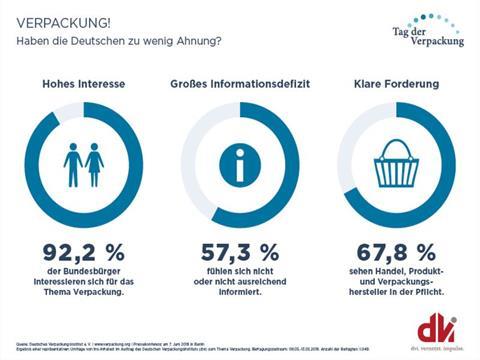
According to a recent survey, the majority of Germans feels unable to objectively judge packaging and feels that there is a lack of information. Although this survey focused on Germany, results would likely be similar in other European countries, including the UK.
On the occasion of the „Day of Packaging 2018“, DVI, the German Packaging Institute has published recommendations for trade, product and packaging manufacturers.
Some of the results in short: 92.2% of Germans are interested in the topic of packaging, almost 60% feel that they don’t have sufficient information in order to be able to judge important aspects of a pack, and over two thirds (76.8%) think that it is the job of trade (23.5%), product (22.6%) and packaging manufacturers (27.1%) to provide information.
DVI’s position
Thomas Reiner, chair of DVI, explains: “Misjudgement and mishandling of packaging happens regularly. The main reason for this is that consumers are not sufficiently informed about important aspects of packaging, such as its function, eco-balance and recyclability, and sometimes aren’t even aware that they are missing information. People have the right to access reliable information so that they can make the right decisions for themselves when using packaging, and they need more transparency and better information. At dvi, we expressly welcome and support the fact that product manufacturers, packaging manufacturers and retailers in particular, are obliged provide this information. We are committed to more and better information, and we offer our expertise to find the right solutions.”
In order to combat confusion, DVI has put together a list of recommendations.
Product manufacturers
Better information about packaging
While detailed product information about origin, composition, ingredients, calories, nutritional values or allergens is available, the packaging itself often remains an ‘information desert’. But transparent information about it is needed to the same extent.
More transparency with materials used
Honest information about a pack’s purpose, its ecological balance, the materials used and its ability to be recycled, with clear instructions.
Packaging manufacturers
Making information more accessible to all
Packaging manufacturers must live up to their growing importance and responsibility. Facts should be processed objectively and made accessible. The provision of objective product information is key, not just to customers, but also to the general public. With around 500,000 employees in Germany and Austria, the companies in the packaging industry generate a total output of over 50 billion euros and include several world market leaders. The industry is highly innovative and powerful. So there is no need to hide.
Taking global packaging responsibility seriously.
There is no alternative to taking responsibility, even on a global scale. Anyone operating on the world market must also provide information about packaging in line with the market and in a responsible manner.
Retailers
Making better use of the direct line to the consumer
Retailers have direct access to consumers. The sector should make much greater use of this and play an enlightening role - combined with concrete solutions. The disadvantage of the household collection system for used packaging via the yellow bag in Germany is that the waste has to be laboriously sorted after collection.
Promote innovative recycling solutions
Take the example of PET. Direct take-back by retailers, as happens in Germany with PET bottles, can result in a much higher degree of sorting purity of collected packaging. Recycling then becomes much easier, more efficient and more sustainable. Even if this is not feasible for every type of packaging, there are still plenty of possibilities, for example in the area of trays and cups made of plastic.
Conclusion
"If packaging is often misjudged and discriminated against, this is not least due to our own failures. All market participants must learn from this. Only well-informed consumers can handle packaging correctly, close the loops and make conscious decisions", Thomas Reiner comments on the recommendations for action.










